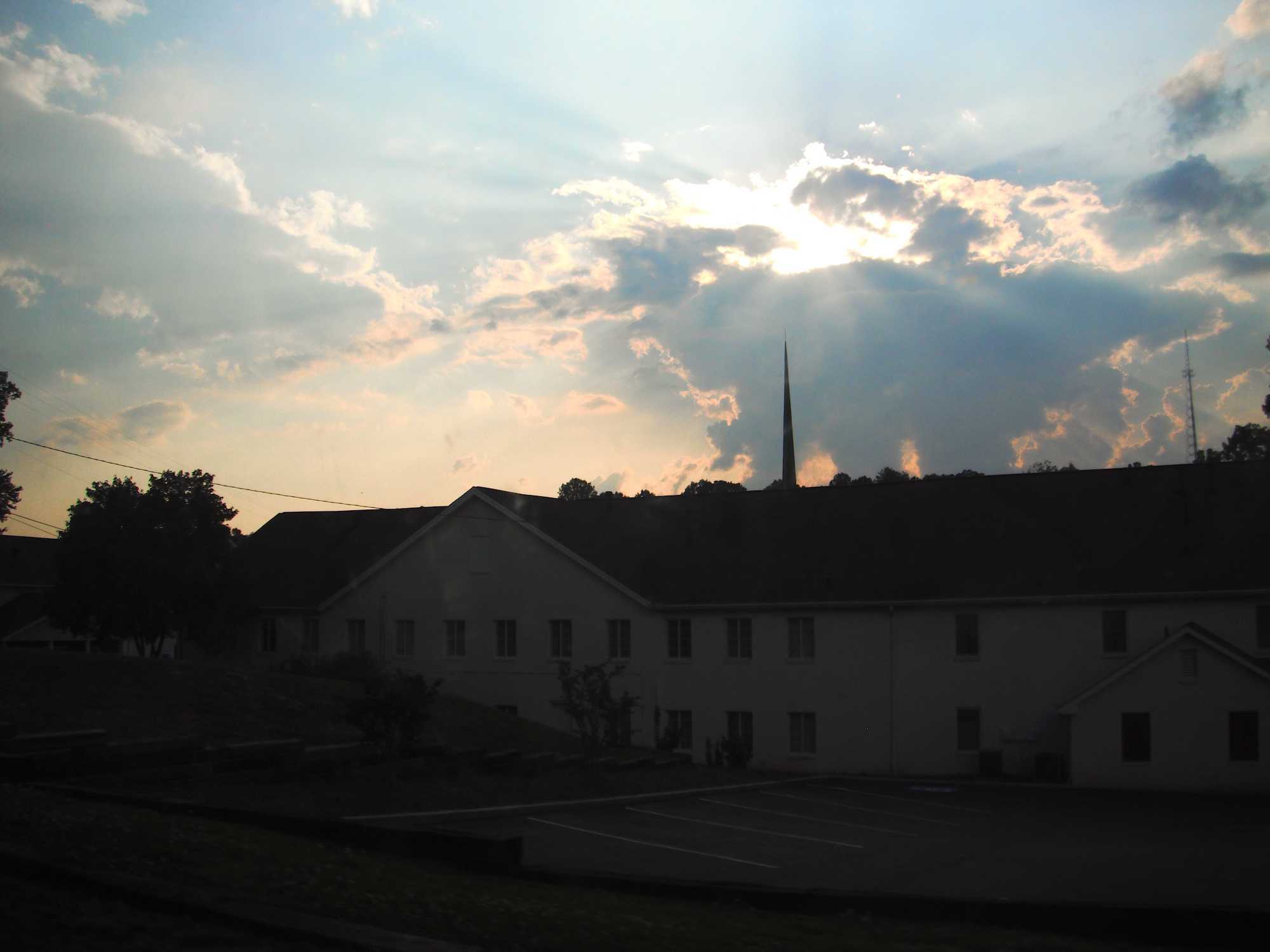Your donation will support the student journalists of North Cobb High School. Your contribution will allow us to purchase equipment and cover our annual website hosting costs.
Have a little faith
December 10, 2015
Kennesaw Elementary, the school providing education for students K-2nd grade, buzzes with activity on a quiet Sunday morning. People in a mix of casual wear and Sunday best fill foldable chairs set up in the school’s cafeteria, sporting cups of Starbucks coffee and watching as the stage fills with instruments, microphones, and television monitors. The same children who attend the school during the weekday run around their turf as adults herd them away from their parents and into groups. Soon enough, the lights die down and the crowd takes their seats, preparing for prayer.
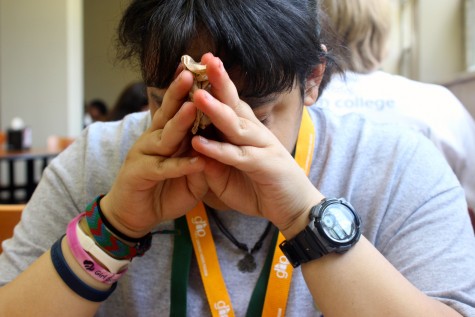
A student prays before eating at NC. The daily occurance of school does not hinder students’ beliefs or practices, which they bring to share at school.
Residing in the eponymous Bible Belt, Cobb County, Georgia boasts a booming population of religious organizations and followers. Faiths of all different kinds fill the community, including Christian, Muslim, Jewish, or agnostic. With such an environment of citizens expressing their faith, holy days in Cobb County buzz with action at local churches, temples, mosques, and more.
For example, Sundays at 10 AM at Kennesaw Elementary bring together the parish of Highpoint Church under the supervision of lead pastors Andy and Amy King. The non-denominational church set up shop in Kennesaw in August of 2014 and aims to spread the word of God to the community. Operating at a local landmark in an easy-to-find location majorly helped the parish gain followers.
“HighPoint Church exists to establish followers of Jesus Christ in heart, mind, and action,” lead pastor Andy King said. “Because of Atlanta’s culturally rich history, ethnic diversity, explosive population growth, and thriving college community, we believes it was the perfect place to plant a church and see God move in extraordinary ways. Our aim is to inspire [our members] to impact our city, our nation, and our world.”
Watching the church’s Facebook page exemplifies the young parish’s large impact on the local community. Highpoint Church boasts a perfect 5.0 stars out of 5.0 on Facebook’s review system, and the comments exemplify community members’ thankfulness.
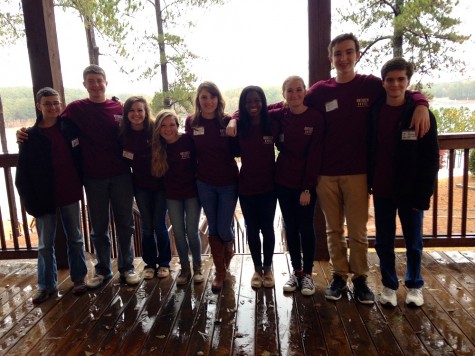
Local high school students and Transfiguration ChrisTeen members bond at a church retreat, including North Cobb alumna Catherine Lamb. The church hosts retreats for various grade levels to encourage parish bonding and spread the good word. Church member and NC junior Josh Joines reflects on his time on a retreat: “The retreats really made me think about my spiritual life and where I stood for a whole weekend, and they help me get involved with the church.”
Farther down the road, Transfiguration Catholic Church, located on Blackwell Road in Marietta, provides a large and experienced parish for Roman Catholics. Operating since 1988 and in an archdiocese with more than 1,000,000 people, parishioners at Transfiguration involve themselves not only at Saturday and Sunday masses, but through 58 different ministries, religious education, music and liturgy, and more.
Transfiguration’s Parish Religious Education Program (PREP) teaches students from kindergarten through 8th Grade on Wednesday and Sunday nights. The program allows kids from all around Cobb County to learn about their religion and get involved in church events like retreats and charity drives. All of the catechists, or teachers, who educate the children participate by volunteering their time to further the religious education of the community’s kids.
Director of Youth Ministry Joyce Guris reflects on her time as a teacher: “I have been teaching in the Parish Religious Education Program (PREP) for more than 25 years; I actually started teaching when I was in 10th grade. I always wanted to be a teacher and love teaching about God and our faith, so helping all of the kids growing in faith and learning about their religion through Transfiguration is a perfect fit for me. I think if I didn’t work at Church, it would be easy to not have Jesus as the center of my life, and now every day I can remember that everything I do should magnify God’s love.”
The church’s ChrisTeen program, centered on letting teenagers from grades nine to twelve further their beliefs in group settings, consists of almost 500 members. Through mission trips, retreats, and other fun-filled events, local teenagers come together to reflect and lead their church.
ChrisTeen member and Harrison High School junior Christy Chu reflects on the program’s effect on her: “For me, my church has brought me not only the most important friends I’ve ever had, but also the kind of lasting peace that motivates me to be who I am. Church has changed me into someone who is positive, finds meaning in the details, and always seeks the good in people.”
Outside of the Bubble
Though the Bible Belt encompasses most religious organizations in Cobb County, other religions celebrate their beliefs as well. Christianity mingles with Islam, Hinduism, Judaism, and more on a daily basis.
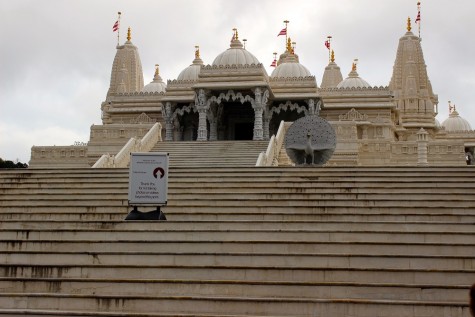
The BAPS Shri Swaminarayan Mandir’s shrines, carved out of marble and limestone. The peacocks, the national bird of India, situated on the steps before the temple symbolize prosperity and good luck.
Lilburn, Georgia houses the largest Hindu temple in the Southeast, the BAPS Shri Swaminarayan Mandir. The temple serves the entire southeast as a center for Hindu activities, attracting Hindus from across multiple states.
“Especially during the Hindu holiday of Diwali and Hindu New Year we have thousands of people who come through for blessings, so much that we have to get approval to use our fire exit to alleviate the crowds,” Jaibala Raval, tour guide and member, said. “Our family activity center pulls in youth and families from across the area for activities. Atlanta is the regional center for the southeast, so for big festivals or special days people will travel here. On any given Sunday we will have over 500 people in our Sunday assemblies, but thousands in general during festival days. This location, because it’s close to I-85 makes it very accessible for people traveling in.”
Wheeler High School junior and long-time patron of the temple Anuja Mehta explains its significance to her family: “We go to BAPS on special occasions, like religious holidays and birthdays, to get blessings from God. Having the temple here reaffirms our faith but it’s also a social and spiritual or religious gathering place. It’s nice to have a really spiritual place so close that allows us to connect with God.”
Muslims in the Cobb County area can find their faith community in the Al-Farooq Masjid, established in 1980 as one of the only mosques in the southeastern United States. The mosque, which also includes a parochial school and an academy to facilitate memorization of the Qur’an, services the Muslim population of Atlanta, currently estimated at 75,000 people. The religious school teaches over 100 kids every weekday, and the other academy currently instructs 27 full-time resident students. The number of regular patrons at the mosque changes frequently, based on several factors.
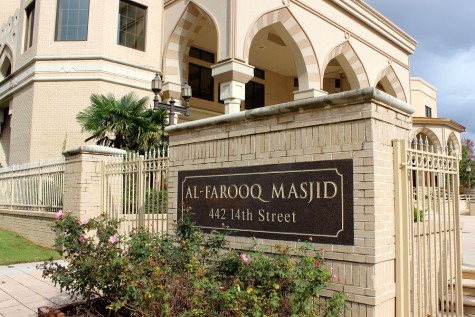
An intricately carved sign invites patrons to one of the largest mosques in the Atlanta area, Al-Farooq Masjid.
“Mosques are built around communities, and communities are built around mosques,” representative Y. Khalid Siddiq said. “Mosques have no membership, people come and people go. You can go to any mosque, and not have to pay dues or become a member. The times of the prayers are universal, and since there is no membership and the language of the prayers are the same, you can be anywhere in the world and feel right at home in any mosque. Because of this, our mosque gets any number of people traveling in and out of Atlanta from over 50 countries, including Nigeria, Ghana, Saudi Arabia, Egypt, India, Pakistan, Bangladesh, Malaysia, as well as residents of the local area. Somedays we are full, and others the crowd is lighter. It all depends on the day.”
As for Judaism, the east side of Cobb County boasts a large Jewish community. Organizations like the Chabad of Cobb and Temple Kol Emeth fill the Cobb area with places of worship for Jews.
“I live in East Cobb so I live in the area with a large Jewish population,” North Cobb senior and Jew Lindsay Deutsch said. “I feel like between growing up in East Cobb and going to North Cobb High school my beliefs are a little different than North Cobb than in East Cobb. I had more friends with the same beliefs in East Cobb than I do now, but it hasn’t changed my exact beliefs. I still believe what I believe and I enjoy seeing different religions and ideas passed around.”
Religion at North Cobb
At NC, the topic of religion finds its place in casual conversation between the school’s Magnet, or advanced, kids. While discussion of religion does occur outside of the program, it appears the most through the advanced learners. As all kinds of students discuss their respective beliefs, they learn more about their own beliefs and help others to learn about their faith.
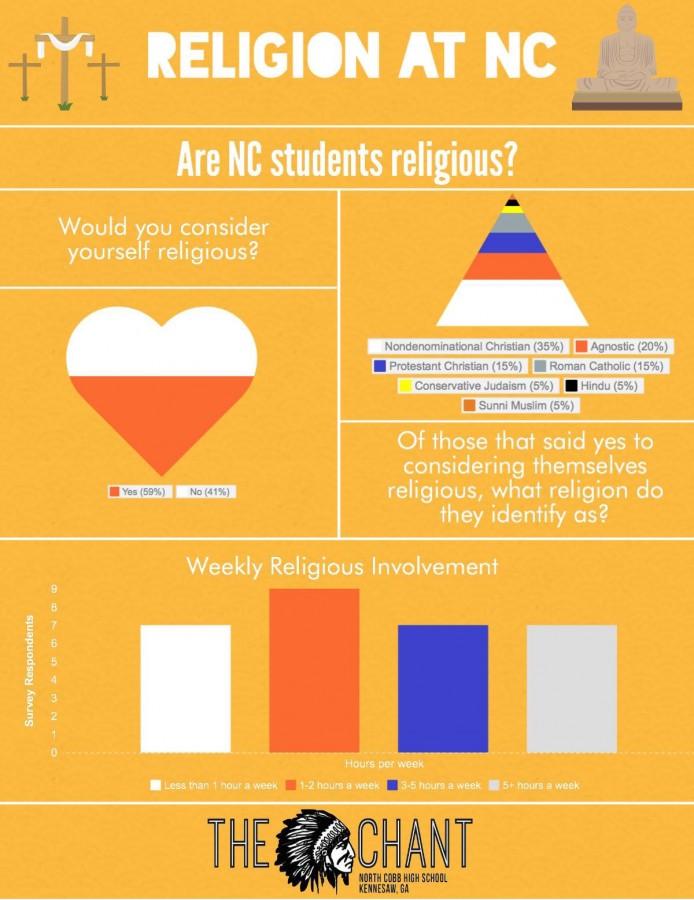 Kat Shambaugh
Kat Shambaugh
In a survey of 50 random students (non-Magnet and Magnet alike), 59% of students at North Cobb would define themselves as religious, with most identifying themselves as non-denominational Christian (35%). Other branches of Christianity with large representation include assorted branches of Protestantism (15%) and Roman Catholic (15%). Self-proclaimed agnostics make up 20% of the population. Lastly, minorities of Conservative Judaism, Sunni Muslim, and Hindu exist.
Of students who consider themselves religious, 31% spend one to two hours a week practicing their faith. Small percentages reported spending less than one hour a week, three to five hours a week, and more than five hours a week.
Religion and faith affects students at North Cobb differently. For some, the variety of faiths positively influences their own, through job opportunities, faith groups, and opportunities to learn about other religions.
“This area is a lot more diverse than my own area, so I get a lot of perspectives on my own religion and others, especially from local people here,” one respondent said. “People really think that Islam is centered in the Middle East but I meet people from Asia and South America that are Muslim and have really interesting perspectives on the religion that I never thought of. And religion in general, this area has made me way more open to religions because I had never met Buddhists or other religions before I came here, so I think it has made me more open.”
Other students found negative experiences from the area, including pressure from others to convert and losing touch with religion in an area with a large number of choices.
One student reported feeling angered from the pressure to choose a religion: “Some people here have been [jerks] when it comes to believing in religion and have made me stray myself even further from my own.”
Lastly, a small percentage of students surveyed reported no effect of the county on their beliefs, claiming their faith stays the same no matter what others believe. Others wrote that the effect comes from other places.
“The county has not really affected my religious beliefs,” a student said. “It’s more my school that has affected my beliefs more strongly. Even though I consider myself religious, I am much more open and accepting than I was before because I embrace differences and loving everyone. That’s what is really important. And I guess I’ve just grown so much since freshman year and in who I am and how I identify with my religion.”
A Faith-filled Community
In Cobb County, Georgia, a wide variety of faiths from Christianity, Islam, Judaism, Hinduism, and agnosticism mix in the schools and through the community. Each religion found its niche in the area. Living here allows citizens to experience as many faiths as they can imagine, all while practicing what they believe and finding their own true meaning.
